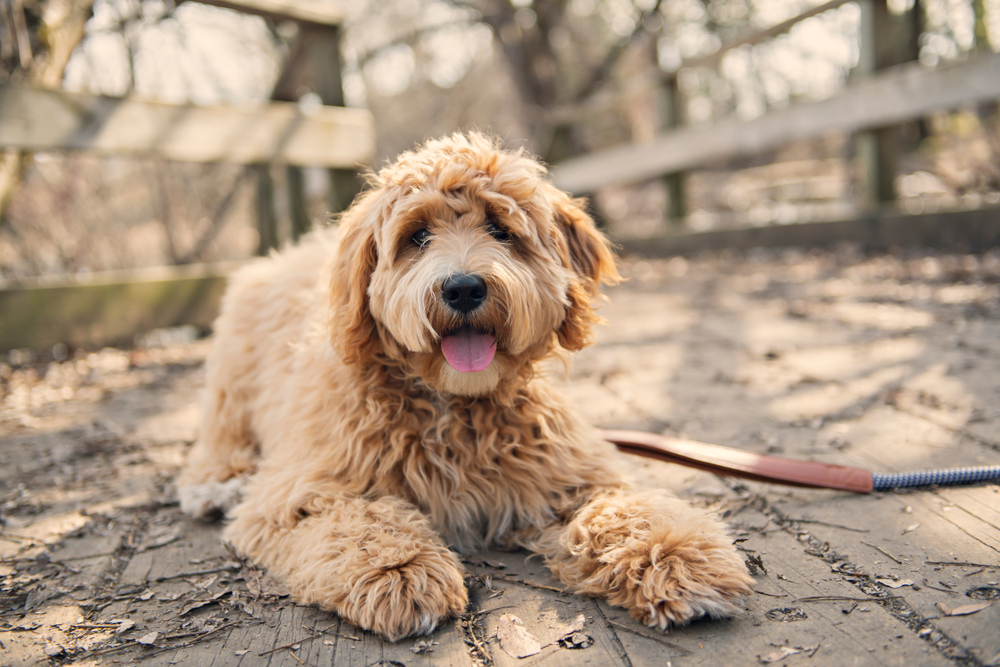**If your dog is struggling to breathe, is weak and having difficulty standing, or if his tongue is blue or gray, please seek emergency veterinary care IMMEDIATELY as this may be a life-threatening emergency!**
One of the most common concerns of pet parents is related to their dog’s breathing. At AskVet, we frequently encounter questions such as, “why is my dog breathing heavy?”, “why is my dog panting so much?”, and even “my dog is making funny noises while he’s breathing!”.
We’ll discuss some of the most common causes of changes in your dog’s breathing below. First, we’ll teach you how to count your dog’s respiratory rate per minute. This is important information to have if there are any concerns about your dog’s breathing.
What is Your Dog’s Respiratory Rate?
When you take your pup in for a vet visit, you probably notice that the vet tech or doctor takes your dog’s vital signs. One of these vital signs is your dog’s respiratory rate, or breaths per minute. This is an essential step in a dog physical exam checklist.
The most accurate way to assess a dog’s respiratory rate is actually while they are sleeping! (This is impossible at the veterinary clinic for obvious reasons!) This way, any variation in breathing due to activity, level of alertness/excitement, or anxiety is eliminated and you obtain a true evaluation of whether your dog is breathing more quickly than normal.
To take your dog’s respiratory rate, wait until they are sleeping (or very relaxed). Look at your dog’s ribcage rise and fall. Each rise and fall is counted as ONE breath. Now, use the stopwatch feature on your phone, or the second hand of a clock, to count how many rise-and-fall cycles are completed in sixty seconds—that is your dog’s respiratory rate! (You can also count for thirty seconds and multiply by two.)
Normal sleeping respiratory rates should be below 30 breaths per minute. If your dog is breathing more quickly than this, take a video of their breathing and chat with AskVet so a veterinarian can assess your dog further. Note: some dogs have normal sleeping respiratory rates as low as ten!
Noisy Breathing
Is your dog making noises like a snorty little piggie when she’s breathing? If your dog has a short face (like most Frenchies, English Bulldogs, Pugs, and Boston Terriers), and has been making noises like this her entire life, then this is likely due to something called “brachycephalic airway syndrome.” These pups are SO CUTE, but as a trade-off to that level of adorableness, we can see significant breathing problems!
Brachycephalic airway syndrome is a very common cause of noisy breathing. So, why does your smushed-face pup snort and snore all of the time? The answer is simple: since all of the same anatomical structures in long-nosed dogs are compressed into a face that is one-third the length, all of that extra skin and soft tissue will create more turbulence of the air moving in and out of your dog’s mouth, nose, and throat. In some cases, surgery can be done to improve their breathing and open up those airways (and improve their quality of life). Your AskVet veterinarians are happy to discuss this syndrome with you and prepare you for a visit with your family veterinarian to discuss these options!
However, if your dog has a long nose, or if your dog was always a quiet breather and now is suddenly making snort-type noises, then this can be a cause for immediate concern. Take a close look at your dog’s face. Is she having any milky white, green, or yellow discharge from her nostrils? If so, this may indicate a sinus infection, or a piece of grass stuck in her nose, or (very rarely, thank goodness) a mass in her sinuses. Sometimes dental problems will also cause noisy breathing and nasal discharge, since the roof of the mouth is also the floor of the nasal cavity. Your veterinarian can do a thorough physical exam and discuss what is likely to be going on with your pup, and if any treatments or further testing are needed.
If your dog is making noise while he breathes and there is NO discharge from his nose, then he could have a mild upper respiratory infection (like kennel cough or allergies). These conditions are usually easily treated, and frequently occur with your dog constantly coughing and noisy breathing.
Another possibility more often seen in larger-breed dogs is laryngeal paralysis. In this condition, small flaps of cartilage that form the voicebox will sometimes become weaker and droop as they age, preventing air from moving in and out like normal.
Since increased airway turbulence and noisy breathing can reduce your pup’s ability to cool off when it’s hot outside or when they are exercising, it’s important to keep him quiet, cool, and calm until he can be evaluated by your veterinarian in person.
Breathing Too Fast
If you have noticed your dog breathing more quickly recently, it could be nothing to worry about! As you probably know, dogs release their body heat through panting and breathing quickly. Since they can’t sweat as efficiently as human beings, we can see our dogs breathing more quickly in warm weather (signs of heat stroke in dogs) and after exercise. If, however, you notice your puppy breathing more rapidly and there has been no recent change in temperature or recent exercise, then this may be the first clue that your dog needs your help.
Heart Disease
If your dog has been diagnosed with a heart problem, any increases in his respiratory rate should be taken seriously. If his sleeping respiratory rate is above 30 breaths per minute (see above), then he should be evaluated by a veterinarian right away—even if that means taking him to an emergency clinic. Research has shown that a sleeping respiratory rate above 30 in a dog with heart disease is highly likely to indicate fluid build-up in the lungs, or congestive heart failure. Please chat in with an AskVet veterinarian to help you determine if an ER trip is necessary.
Lung Problems
As you can imagine, lung problems are another common cause of rapid breathing. Just like people, dogs can develop medical conditions such as bronchitis, pneumonia, fungal infections, parasitic infections, and (thankfully rarely!) even cancer in the lungs. Heartworm disease is another possible cause of heavy breathing, but monthly heartworm prevention can almost completely eliminate the risk of this disease.
To look for any of these lung diseases, your veterinarian will likely start by taking radiographs (x-rays) of your dog’s chest to evaluate the heart and lungs. Bloodwork may be recommended as well to check for inflammation and certain types of infectious diseases that can affect the lungs. Sometimes, your veterinarian will recommend seeing a specialist for a look down your dog’s airways using a camera in order to diagnose the problem and collect cells to look at under the microscope.
Problems Outside of the Lungs
Sometimes, a dog’s heart and lungs are perfectly healthy and they are still experiencing rapid breathing due to a medical problem. For example, your dog’s red blood cells carry oxygen around the body. If your dog doesn’t have enough of these red blood cells (a condition called anemia), her body will try to increase the amount of oxygen available by breathing quickly.
If you have noticed other changes in your dog such as increased thirst and urination (how much water should my dog drink?), changes in her appetite, or any vomiting or diarrhea, then your pup’s rapid breathing may be related to a hormone problem. For example, diabetes and Cushing’s disease are common culprits of increased breathing! Your veterinarian may want to screen for these conditions by performing bloodwork and testing your dog’s urine.
Anxiety can cause excessive panting in dogs, too. Dogs experiencing signs of separation anxiety in dogs, storm and noise phobias, or who find themselves in a fearful situation will often pant during the event. They will usually return to normal when the event is over, but this can be a sign that your pup may benefit from some environmental or medication intervention.
In other dogs, rapid breathing can actually indicate that your dog is in pain. We see this most commonly in older dogs who are starting to struggle with arthritis. In these patients, your dog’s veterinarian may prescribe a trial of pain medication to see if that improves her breathing problem.
The Bottom Line
If you have noticed any changes in your dog’s breathing—whether it is increased noise, or more rapid breathing—it’s important to have a veterinarian evaluate your canine companion. That way, appropriate treatment can be started as soon as possible and lead to increased comfort and quality of life—for both of you! To better monitor your dog’s health, take the time to read our guide on the dog physical exam checklist. This way you can become familiar with what is normal and what is not.
Our AskVet veterinary experts are here 24/7 to help you determine how urgent your dog’s breathing problem is, discuss possible causes, and walk you through what testing and treatment your veterinarian may recommend.
Whether you have an immediate need or are looking to improve your pet’s overall wellbeing, just sign into your AskVet account and one of our friendly and knowledgeable veterinary experts will attend to your needs, no appointment required!
Written by:
Allison Ward, DVM
Dr. Allison Ward grew up in the suburbs of Washington, D.C. and started working in veterinary hospitals when she was 14 years old. After graduating from veterinary school in 2011, she completed a small animal rotating internship in New Jersey, followed by a neurology/neurosurgery internship in Miami. After completing this advanced training, Dr. Ward then moved on to general small animal practice. Dr. Ward’s professional interests include feline medicine, neurology, and pain management. Her passion for educating pet owners carries over into her work with AskVet, and she loves being able to help pets and their parents at all times of the day (and night!). She currently resides in sunny south Florida with her two cats, Larry and George.






